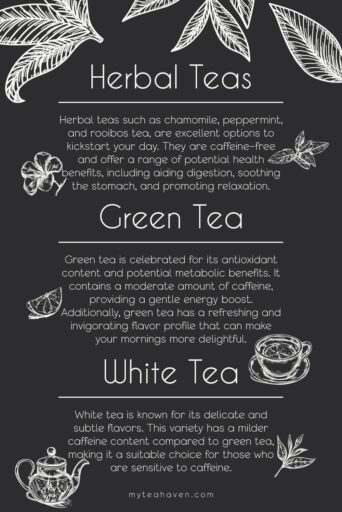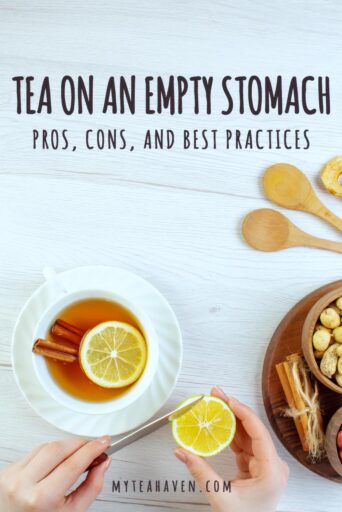Sip, Savor, and Start Fresh: Embrace Tea on an Empty Stomach
Tea on an Empty Stomach: Exploring the Pros and Cons
I recently became a bystander to an interesting discussion regarding the effects of drinking tea on an empty stomach. One side swore that it’s a good thing, and the other insisted it will lead to stomach discomfort. Curiosity piqued, I decided to look more into the topic to understand whether drinking tea without eating anything really is beneficial or potentially harmful. Join me today as we discover the pros and cons!
We are a participant in the Amazon Services LLC Associates Program, an affiliate advertising program designed to provide a means for us to earn fees by linking to Amazon.com and related sites. This post may contain affiliate links which means we may receive a commission, at no cost to you, for purchases made using our links. Please see my disclosure to learn more. Unless otherwise stated, all prices are in US$.
Potential Benefits of Drinking Tea on an Empty Stomach
Improved Digestion
One of the notable benefits of sipping tea on an empty stomach is its potential to enhance digestion. Certain types of tea, such as herbal teas, have natural compounds that can stimulate the digestive system and promote smooth bowel movements.
For instance, ginger tea is known for its soothing properties that can help alleviate indigestion and bloating.
Additionally, peppermint and chamomile tea may assist in easing stomach discomfort.
That being said, individual experiences may and will likely vary, so it’s important to listen to your body’s response!

Increased Alertness and Focus
If you’re looking for a morning pick-me-up, tea on an empty stomach might be just what you need!
Tea contains a moderate amount of caffeine, which can provide a gentle energy boost. Additionally, tea also contains an amino acid called L-theanine. This compound is known for its ability to promote mental relaxation and focus. This potent combination can induce a state of calm alertness, enhancing cognitive function without the jitters associated with excessive coffee consumption. It’s like a soothing symphony for your brain!
Weight Management
For those looking to manage their weight, tea on an empty stomach can be a valuable companion. Some studies suggest that tea, particularly green tea, may boost metabolism and promote fat oxidation. The catechins and antioxidants present in tea have been associated with increased calorie burning and improved fat breakdown.
That being said, it’s important to remember that tea alone cannot replace a balanced diet and exercise. Incorporating tea into a healthy lifestyle can be a supportive element in your weight management efforts!
Antioxidant Boost
Tea is renowned for its antioxidant properties, and drinking it on an empty stomach allows your body to fully absorb and utilize these valuable compounds. Antioxidants help combat the damaging effects of free radicals, reducing oxidative stress and supporting overall well-being.
Green tea, white tea, and rooibos tea are all rich in antioxidants that can aid in promoting a healthy immune system and reducing the risk of chronic diseases. Enjoying a cup of antioxidant-rich tea in the morning can set a positive tone for the day ahead.
Possible Side Effects of Drinking Tea on an Empty Stomach
While there are potential benefits to drinking tea on an empty stomach, we should also consider the possible side effects. Everyone may experience varying reactions, and it’s crucial to be mindful of your own body’s response.
Below are some factors to keep in mind.
Stomach Discomfort

Drinking tea on an empty stomach may lead to some people experiencing some discomfort, including nausea or an upset tummy. This can be attributed to the tannins present in tea, which can irritate the stomach lining for certain individuals.
If you notice any discomfort, I would suggest consuming tea after having a small snack or light meal.
Listening to your body and finding the right balance is always key!
Acid Reflux
For anyone who is prone to acid reflux or gastroesophageal reflux disease (GERD), drinking tea on an empty stomach may exacerbate symptoms.
Tea contains compounds that can relax the lower esophageal sphincter, allowing stomach acid to flow back into the esophagus. This can lead to heartburn and other discomfort. If you have a history of acid reflux, it’s best to consult with a healthcare professional before incorporating tea into your morning routine.
Best Types of Tea to Drink on an Empty Stomach
The following varieties are known for their gentle nature and soothing properties, and may be a more suitable choice for your stomach:
Herbal Teas
Herbal teas such as chamomile, peppermint, and ginger tea, are excellent options to kickstart your day.
They are caffeine-free and offer a range of potential health benefits, including aiding digestion, soothing the stomach, and promoting relaxation.
Experimenting with different herbal teas can help you discover your personal favorites.

HANDPICK Ginger Tea Bags
Embrace the pure and caffeine-free goodness of our Ginger Tea, meticulously crafted to offer you a premium tea experience. Delight in the invigorating warmth and essence that our Ginger Tea Bags provide, allowing you to immerse yourself in a moment of tranquility with each cup. Our Ginger Tea is carefully prepared without any preservatives or artificial add-ons, ensuring a truly natural and wholesome beverage.
Green Tea
Green tea is celebrated for its antioxidant content and potential metabolic benefits. It contains a moderate amount of caffeine, providing a gentle energy boost. Additionally, green tea has a refreshing and invigorating flavor profile that can make your mornings more delightful. Just be mindful of the caffeine content and how it affects your individual tolerance.

VAHDAM, Himalayan Green Tea Leaves
Exclusive Long-Leaf Green Teas, Hand-Plucked & Produced In High Elevation Tea Plantations In The Himalayas.
White Tea
White tea is known for its delicate and subtle flavors. This variety has a milder caffeine content compared to green tea, making it a suitable choice for those who are sensitive to caffeine. Sipping on a cup of white tea can be a serene and elegant way to start your day.
Rooibos Tea

Rooibos tea, also known as red tea, is a caffeine-free herbal tea that hails from South Africa. It offers a naturally sweet taste and is rich in antioxidants.
Rooibos tea is known for its calming properties and can be a gentle companion in the morning, especially if you prefer to avoid caffeine altogether.
Tips for Drinking Tea on an Empty Stomach
If you’re considering incorporating tea into your morning routine, here are some helpful tips to keep in mind:
Time of Consumption
I recommend waiting at least 30 minutes to an hour after waking up before consuming tea on an empty stomach. This allows your body to activate its natural digestive processes and reduces the likelihood of experiencing any discomfort. Give yourself some time to ease into the day before enjoying your cup of tea.
Moderation
While tea can offer a range of benefits, moderation is always key. Aim for 1 to 3 cups of tea per day, depending on your individual tolerance and sensitivity to caffeine. Listen to your body and find the right balance for you!
Pairing with Food
If you experience any discomfort or sensitivity when drinking tea on an empty stomach, consider having a light snack or a small meal before drinking tea. Pairing tea with some easily digestible foods, such as a piece of fruit or a handful of nuts, can help mitigate any potential side effects and promote a harmonious experience.
A Few Final Thoughts
Drinking tea on an empty stomach can offer various benefits, including improved digestion, increased alertness, weight management support, and an antioxidant boost.
That being said, it’s essential to be aware of potential side effects such as stomach discomfort, acid reflux, dehydration, and interference with nutrient absorption.
Choosing the right type of tea, consuming it in moderation, and considering personal preferences and sensitivities are key to a harmonious tea experience!

Ultimately, let your personal experience guide you in determining the most suitable approach to tea on an empty stomach. Cheers to a delightful and fulfilling tea journey!
Some Questions You Might Have
- Is it safe to drink tea on an empty stomach every day?
While it’s generally safe to drink tea on an empty stomach, it’s important to listen to your body and monitor how you feel. If you experience any discomfort, consider adjusting your tea consumption or having a light snack before drinking tea. Moderation and personalization are key.
- Can drinking tea help with weight loss?
Tea, particularly green tea, has been associated with potential metabolic benefits and weight management support. However, it’s important to remember that tea alone cannot replace a healthy diet and exercise. Incorporating tea into a well-rounded lifestyle can be a supportive element in your weight loss journey.
- Are there any specific teas that should be avoided on an empty stomach?
While individual reactions may vary, teas with higher caffeine content, such as black tea or oolong tea, may have a stronger stimulant effect on an empty stomach. It’s advisable to choose milder options like herbal teas, green tea, white tea, or caffeine-free varieties such as rooibos tea if you’re concerned about sensitivity or potential side effects.
- Can adding milk or sweeteners to tea lessen its impact on an empty stomach?
Adding milk or sweeteners to tea can dilute its potential impact on an empty stomach. If you find that plain tea causes discomfort, adding a splash of milk or a natural sweetener like honey may help mitigate any potential side effects. However, it’s important to note that individual responses may vary, so experiment and find what works best for you.







